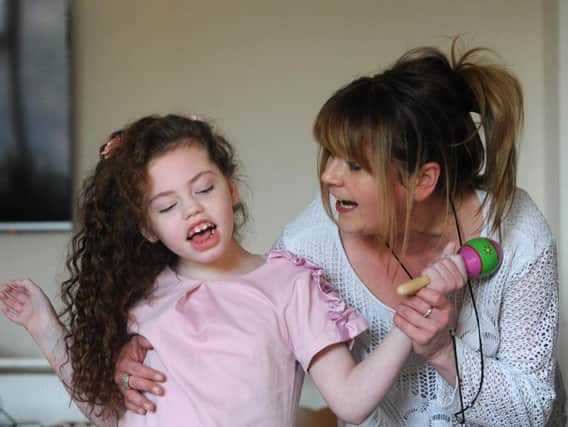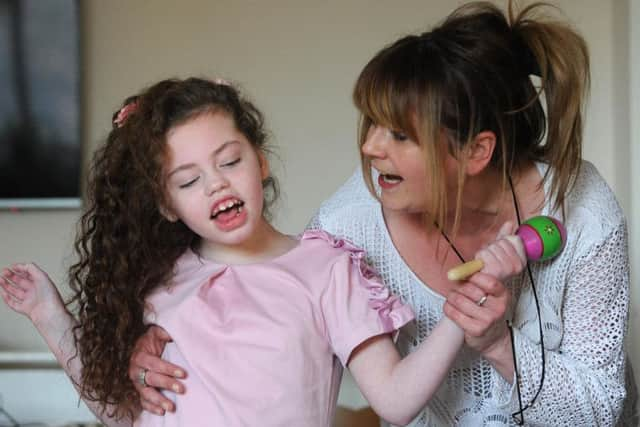"It was a risk worth taking": How Matilda Moffatt gave hope to others with Batten disease


Matilda Moffatt, from Leyland, has Batten disease, a rare genetic disorder which robs sufferers of their sight, mobility, speech, and often leads to death by the age of 12.
She was the first person in the UK to be put on a trial with an American pharmaceutical company where cerliponase alfa - an enzyme replacement - is injected into the brain.


Advertisement
Hide AdAdvertisement
Hide Ad“But it was a risk worth taking. She wouldn’t be here now at the age of 10 without that medication.”
The trial comes to an end next month, and the NHS had been refusing to continue the treatment.
NICE, a government body which decides which drugs and treatments are available on the NHS in England, said a lack of long-term effectiveness meant the treatment was not “value for money”.
Melanie said Matilda had been “given a death sentence”, but earlier this week it was announced a deal had been struck with manufacturers Biomarin and the NHS will now be able to offer this treatment to Batten disease sufferers not currently receiving treatment, by Christmas at the latest.
Melanie said: “I’m absolutely lost for words, speechless.
Advertisement
Hide AdAdvertisement
Hide Ad“None of us who have been campaigning for this can quite believe it. We’ve put the pressure on and it’s paid off.
“If it wasn’t for Matilda doing the trial, going through the danger period, then this wouldn’t be happening for all these other children.”
Matilda was the first in the UK to be put on the trial after Melanie, her friends and family began researching after her diagnosis at the age of four.
Single-mum Melanie said: “I was given her diagnosis on a piece of paper and told to take her home and make her comfortable.
Advertisement
Hide AdAdvertisement
Hide Ad“When I heard about the trial that has started, I just got up and went to London. I had a couple of things to wear and not even a hairdryer.”
Melanie’s determination paid off and Matilda became one of just four children across the world trialling the drug- with three others in Germany.
With the end of the trial looming, Melanie and other families of children with Batten disease in the UK have been battling for the NHS to fund the drug.
Melanie added: “My argument was that children in 23 other countries got this treatment, so why couldn’t we get it?
Advertisement
Hide AdAdvertisement
Hide Ad“We have been to Downing Street, and I’ve had my name mentioned in Parliament which was a shock. But I’m absolutely relieved that I won’t have to deal with Parliament or MPs anymore. I’ve found it very stressful.
“When you have a child like Matilda, you don’t want to have to be dealing with Parliament, learning about politics, who does what, learning about how the NHS works. It’s overwhelming.
“Now I can move forward and I can concentrate on Matilda.”
She added: “What upset me a lot was feeling helpless over what treatment my child got, that the decision was taken out of my hands. Other people got to say whether my child lived or died, and that made me ill.
“Now that has gone.”
Professor Stephen Powis, NHS national medical director, said: “This is important news for children and their families suffering from this devastating disease who can now have access to a life-changing treatment, having endured a long wait for the company to make a fair offer.
Advertisement
Hide AdAdvertisement
Hide Ad“This latest deal coming on the back of a number of other recent successful negotiations demonstrates that there is no reason for other companies not to show equivalent flexibility in order to benefit NHS patients, taxpayers and indeed themselves.”
NHS England has agreed the terms of a commercial deal which has allowed NICE to confirm that it can now recommend this treatment as part of a managed access agreement (MAA), while additional evidence about its effectiveness is gathered over the next four and a half years.
During this period, patients will be able to receive this treatment where clinicians and parents agree that it is suitable.
